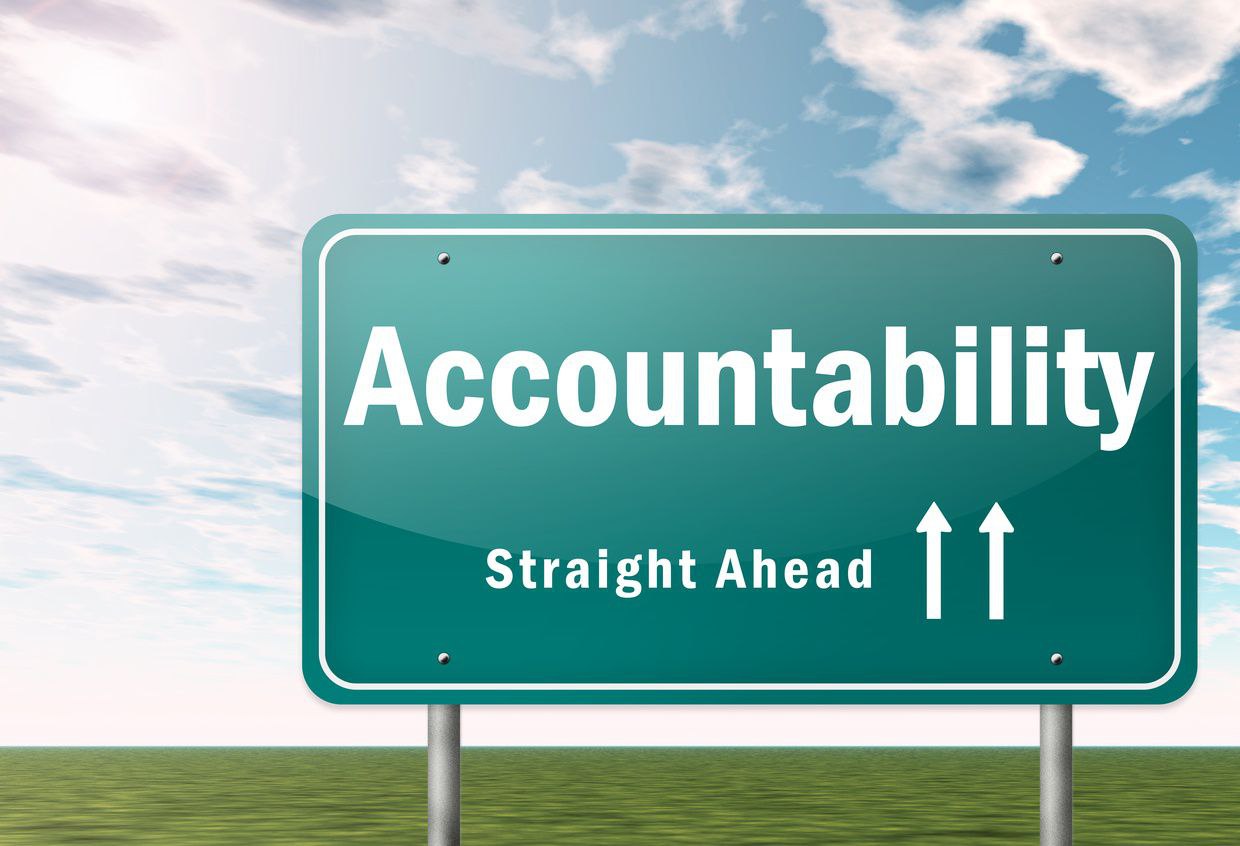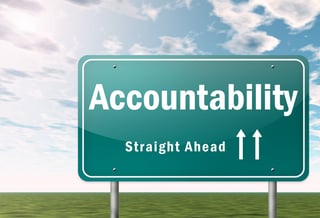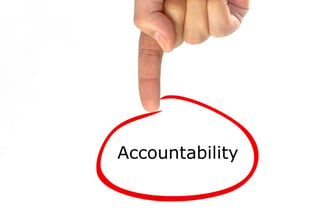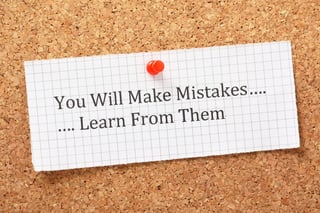
Reflections on Leadership: The Journey of Accountability
Updated from the original publication on March 16, 2017.
Looking at the world today, one might come to the conclusion that we are suffering from an accountability crisis. Whether the discussion is about business, education, health care, politics, or the general subject of changing attitudes in society, the lack of personal accountability is a topic of conversation. In many respects, success in any area of life is tied to creating and sustaining a sense of accountability in individuals and teams of people who work together toward a common goal.
The definition of accountability I like best is pretty easy to understand. “Taking or being assigned responsibility for something you have done or are supposed to do.” Notice that there are two aspects of this definition – “taking” and “being assigned”. Both are essential, and I would argue that taking personal responsibility is required before any assignment to others is possible. We will try to deal with both of these concepts in what I refer to as the Journey of Accountability.
Steps in the Journey of Accountability:
The world is not always about me, and it is not always fair.
The most common mistake people make in terms of embracing personal and professional accountability is the unfairness excuse. In a perfect world, every person or organization has the same opportunity to succeed. Unfortunately the world is not a fair place, and there may be occasions when the deck is stacked against us. What are some of the most likely reasons for unfairness? Here are a few examples – an adverse regulatory environment, anemic economy, difficult labor market, competitors with a financial or structural advantage – and the list could go on. Many (if not all) of these things may be true at any given time, and it is easy to get stuck and never move on from being the victim of an unfair world. It is critical for leaders to acknowledge that they are not the only ones who have to struggle with unfair conditions. The question is this – Knowing that the world is an inherently unfair place, what decisions can we make to lead our team to excel in this environment?
I cannot wait for the world to change to accommodate me, or change the world to meet my needs.
But I can change my behavior in response to the conditions around me. It can be tempting to look around and decide to wait until conditions improve before taking on the hard work of leadership. Unfortunately, this can become an ever receding goal line that leads to perpetual procrastination. The conditions are what they are, but the effectiveness of leadership is the variable that will distinguish the successful from those who fail. Leading involves doing something positive to make a difference. Accountability in leadership is anchored in a predisposition toward action, rather than the tendency to wait and react.
The Journey of Accountability must start from within.
 Before a leader can hold others accountable, they must model personal accountability. For every leader, accountability starts by looking in the mirror. Many leaders fail at this step, assuming that accountability is all about holding others to their tasks, often using a blaming tone as a method for pointing out who is at fault. Skipping the step of modeling personal accountability can make it impossible to inspire others to join you in the Journey of Accountability. In the book, The Oz Principle, authors Connors, Smith, and Hickman make it clear that the question of accountability is not focused on others. Its’ origins are highly personal. They pose the essential leadership question “What else can I do to rise above my circumstances and achieve the results I desire?
Before a leader can hold others accountable, they must model personal accountability. For every leader, accountability starts by looking in the mirror. Many leaders fail at this step, assuming that accountability is all about holding others to their tasks, often using a blaming tone as a method for pointing out who is at fault. Skipping the step of modeling personal accountability can make it impossible to inspire others to join you in the Journey of Accountability. In the book, The Oz Principle, authors Connors, Smith, and Hickman make it clear that the question of accountability is not focused on others. Its’ origins are highly personal. They pose the essential leadership question “What else can I do to rise above my circumstances and achieve the results I desire?
Clarifying expectations of myself and others must precede any serious effort to improve accountability.
One of the common failures in leadership is lack of clarity in expectations in ourselves and those around us. It is impossible to be accountable for achieving a result that has not been well defined, including how the individual’s day to day work contributes to the achievement of the overall goal. This is why position descriptions are important and timely feedback is critical in the relationship between a leader and his or her team. If your team is underperforming, the first question to ask is whether or not the expectations are clear.
As a leader I need to acknowledge my own role and responsibility for establishing a climate of accountability.
In my experience, accountability and empowerment are Siamese twins. Creating a climate of accountability starts with engaging your team in the discussion of accountability and how everyone can work together to achieve the desired result. It also means that when someone is accountable for a result, that they are empowered to take action. Assigning accountability and withholding the ability to take the initiative to do something positive will only result in lower morale and poor outcomes. The freedom to make well intentioned  mistakes is a requirement for establishing a climate where accountability is embraced. Finally, the language of blame placing must be expunged from the leadership lexicon. I like a quote that is attributed to basketball coaching icon, John Wooden. “Nobody is a real loser until they start blaming someone else.”
mistakes is a requirement for establishing a climate where accountability is embraced. Finally, the language of blame placing must be expunged from the leadership lexicon. I like a quote that is attributed to basketball coaching icon, John Wooden. “Nobody is a real loser until they start blaming someone else.”
The healthiest form of accountability in an organization is voluntary, mutual accountability that is imbedded within the culture of the organization.
Mutual accountability includes the freedom to respectfully express our expectations to other team members and to accept their observations about your own performance without becoming defensive. Candor in problem solving is at the heart of mutual accountability. If an individual team member is not behaving responsibly, someone must be willing to confront this shortcoming for the good of the organization. Mutual accountability does not give us the option of looking the other way and ignoring poor performance.
All healthy relationships have an element of accountability. Whenever I call my son to see if he can go fishing, his response is predictable. “Can I call you back? I need to check to make sure it is OK with my family schedule.” As a husband and father of two adorable children, he understands that being accountable for where you go and when you return conveys respect, commitment, and an understanding of the needs of the people he cares about most.
Accountability and Corrective Action
In some organizations “holding someone accountable” has been translated into taking corrective action. This confusion can be particularly counterproductive, and should be strenuously avoided. While a corrective action process may be a necessary form of discipline when circumstances require, pairing corrective action with the broader concept of accountability can seriously erode the positive aspects of accountability in the organization’s culture as people aspire to work together in a trusting and cohesive spirit every day.
Ultimate Accountability
Finally, accountability has a spiritual dimension. Stewardship – one of PSL’s founding leadership principles is based on the principle that every person is accountable to God, the creator and sustainer of all things. Stewardship calls us to be accountable for how we use every resource - time, talent, money, our community relationships, the environment, and even the opportunities to reach out to help those in need. This is an accountability that supersedes all others, and provides a clear model for how we should live every moment of life.
About Steve Proctor
As the now-retired CEO of Presbyterian Senior Living, Mr. Proctor was employed by PSL from 1971 - 2019. He is a Registered Nurse and Licensed Nursing Home Administrator with a BS degree in business administration from Elizabethtown College. He also holds a master’s degree in gerontology from the University of North Texas. Before becoming CEO, Mr. Proctor was Chief Operating Officer for 16 years. In addition, he has served as a Board member and is a Past President of the Pennsylvania Association of Non-Profit Homes for the Aging (“PANPHA”). In November of 1995, the American Association of Homes and Services for the Aging (“AAHSA”), now known as LeadingAge, recognized Mr. Proctor’s proven leadership and accomplishments by electing him to serve as Chair of its national board of directors. He served as Chair-elect in 1996 and 1997, as Chair in 1998 and 1999, and as past-Chair in 2000 and 2001. He has also served as chair of the International Association of Homes and Services for the Aging.

